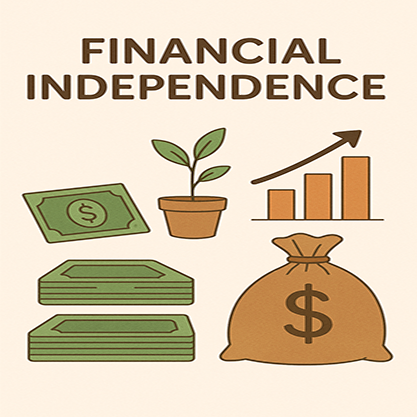Financial Independence: Your Path to Freedom

Financial independence means having accumulated enough financial resources—savings, investments, or passive income—to cover your living expenses without relying on a paycheck or active employment. It gives you the freedom to make life choices without the constraint of financial stress.
Understanding Financial Independence
Achieving financial independence doesn’t necessarily mean you stop working. Instead, it means you gain control over your financial future, with the ability to work by choice rather than necessity. Your sources of income could include dividends, interest, rental income, pensions, or income from side businesses.
Why Financial Independence Matters
- Freedom of Choice: Pursue passions, hobbies, travel, or spend more time with family without financial constraints.
- Security and Peace of Mind: Protection against job loss, emergencies, or unexpected expenses.
- Improved Quality of Life: Reduced stress and the ability to live life on your terms.
Steps to Achieve Financial Independence
- Set Clear Goals: Define what financial independence means to you, including your desired lifestyle and financial needs.
- Create a Budget: Track income and expenses to identify areas to save more money.
- Build Emergency Savings: Save at least 3-6 months’ worth of expenses for unexpected needs.
- Eliminate Debt: Pay off high-interest debts to reduce financial burdens.
- Invest Wisely: Grow your money through stocks, bonds, mutual funds, real estate, or other assets that generate passive income.
- Develop Multiple Income Streams: Diversify your income sources beyond your primary job.
- Maintain Discipline and Patience: Financial independence is a long-term goal requiring consistent effort and smart money management.
Expert Reminder
Start as early as possible. The power of compounding investments means even small regular contributions can grow significantly over time.
Common Financial Independence Strategies
- FIRE Movement (Financial Independence, Retire Early): Extreme savings and investing to retire decades earlier than traditional retirement age.
- Lean FIRE: Achieving basic financial independence with frugal living.
- Fat FIRE: Financial independence with a lifestyle that includes luxuries and higher spending.
Challenges on the Road
Achieving financial independence requires managing risks such as unexpected expenses, market volatility, inflation, and lifestyle inflation. Planning carefully and staying adaptable is key.
Conclusion
Financial independence empowers you to live life on your terms and reduces financial stress. It’s attainable through clear goals, careful budgeting, disciplined saving, and thoughtful investing. Begin your journey today to unlock a future of freedom and security.
